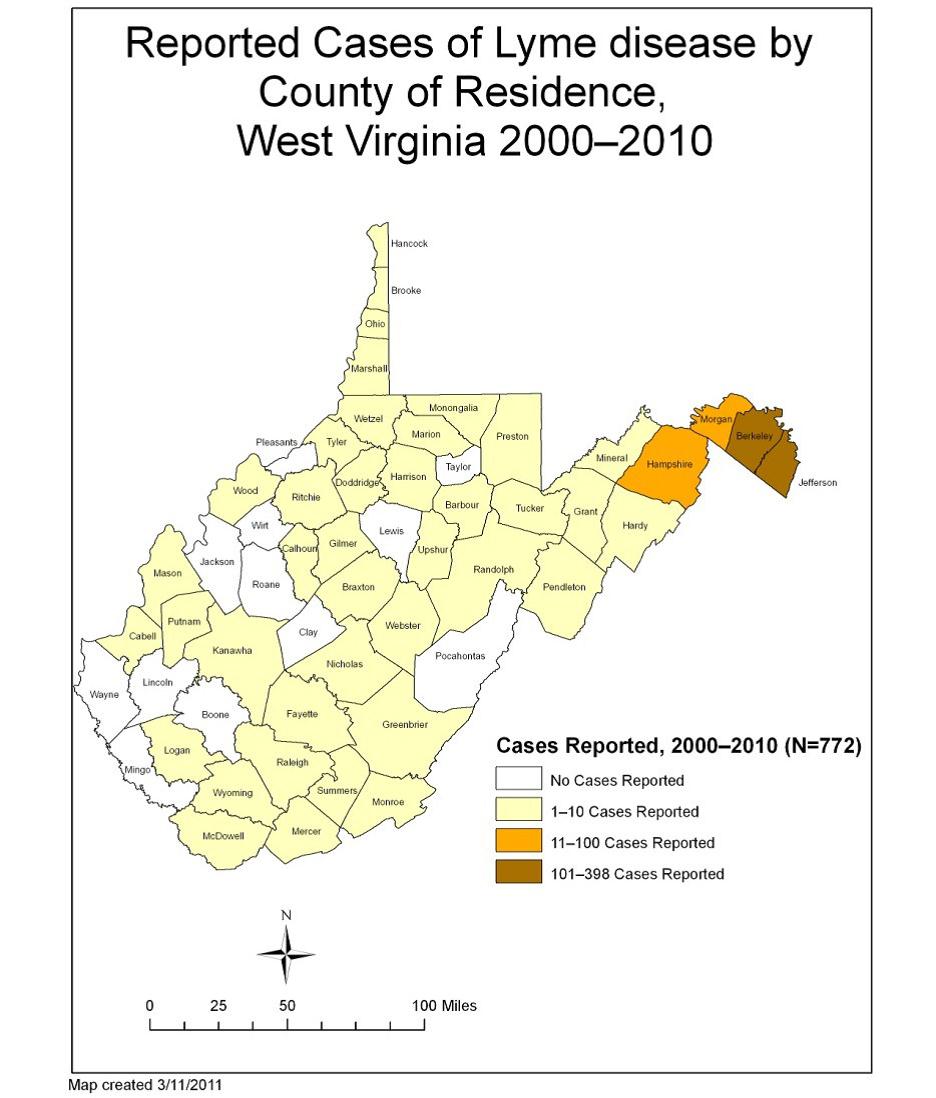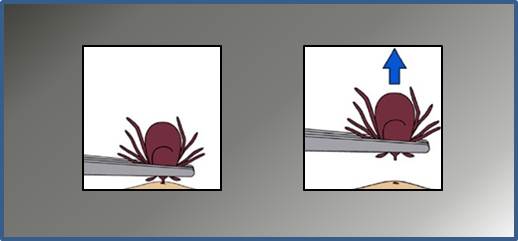Does Lyme Disease Occur in West Virginia?
Lyme disease is the most common tick-borne disease in West Virginia. Most human cases occur in the eastern panhandle of the state (Jefferson, Berkeley, Morgan counties), but the tick that carries Lyme disease (blacklegged tick, Ixodes scapularis) has been found in other parts of the state.
Intial symptoms include: fatigue, headache, fever, stiff neck and a characteristic ‘bulls-eye’ rash. If left untreated, patients may develop problems with joints, nervous system or heart. If campers or staff develop any of these signs or symptoms, they should be evaluated by a physician. |
 |
What Other Tickborne Disease Occur in West Virginia?
All other tick-borne diseases – anaplasmosis, ehrlichiosis and Rocky Mountain spotted fever -- are rare in West Virginia (fewer than 10 cases per year). People with these tickborne diseases develop headache, fever, and rash. These diseases can be hard to diagnose, and the doctor must start treatment immediately if the ill person is to recover. Don’t hesitate to send a child with fever to a physician for evaluation, and make sure the physician knows if the child has been in tick habitat ("woods and weeds") recently.
What Can I Do to Reduce Tick Populations at Camp?
- Keep the grass mowed. If exposed to open, sunny environment, blacklegged ticks are prone to dehydration. Reducing extensive plant undergrowth will also reduce rodent traffic.
- Remove the leaf litter, brush, and weeds along the edge of surrounding woodland.
- Move habitat conducive to small rodents (ex. firewood piles) away from areas with extensive human activity.
- More extensive management techniques involve landscape alteration:
- Build a woodchip, bark, or gravel barrier, 3 feet wide, between the open lawn area and the forest ecosystem to hinder tick movement and serve as a reminder that people who cross the barrier may be at higher risk of getting ticks.
- Increase the amount of sun exposure to areas heavily traversed by the public.
- Build areas used by the public (ex. ball fields) away from a suitable tick habitat.
- Visit the CDC's Landscaping to Reduce Tick Populations Page
What Should I Tell Parents?
Tell parents to pack appropriate clothing and insect repellent when they send their child to camp:
- Pack long sleeved shirts and long pants and socks. Light colors are best because ticks will be easier to see.
- Pack insect repellent with 20% DEET. Read the directions and explain proper use to the child before they come to camp.
What Should I Tell Campers and Staff?
Ticks like "woods and weeds:" wooded environments with extensive leaf litter and shade or abandoned fields and overgrown lawns.
- When possible, remain on cleared paths.
- Before you go into "woods and weeds:"
- Put on your long-sleeved shirts and long pants and tuck your pants into your socks.
- Wear light colored clothing so ticks can be easily spotted.
- Apply bug spray containing 20% DEET to skin, particularly the base of pant legs or ends of sleeves. Follow label instructions carefully.
- After getting back to camp, get a buddy and do a tick check.
- Take a shower after getting back to camp to wash off any ticks.
What Happens If Someone Gets a Tick on Him or Her?
Campers and staff should feel free to ask for help with tick removal. The camp nurse or other designated staff can remove the tick.
Ticks should be removed with a pair of fine tipped tweezers. With the tweezers grasp the tick firmly and as close to the skin as possible. Pull the tick slowly and gradually away from the skin. Clean the bite site with soap and warm water.
DO NOT try to use home remedies like: a match, nailpolish, petroleum jelly, or squeezing the tick to remove it. This can cause bacteria to be introduced to the bite wound. |
 |
Want to Learn More?
Visit: